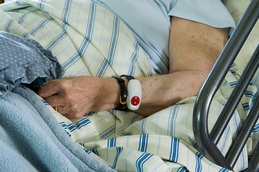Use of the deprivation of liberty safeguards soars in 2014/15

There has been a rise in the number of applications for the use of the Deprivation of Liberty Safeguards (DoLS) in the first two quarters of 2014/15, the Care Quality Commission (CQC) has announced.
The care regulator has said the rise is a positive step towards more providers showing a willingness to protect the rights of individuals who might be deprived of their liberty.
The DoLS is part of the Mental Capacity Act (MCA) and protects the rights of adults in a care home or hospital who lack mental capacity to make decisions in situations where their liberty needs to be deprived, so that necessary care can be carried out in their best interest.
People who lack mental capacity include those with dementia, learning disabilities or a brain injury and are unable to provide consent for necessary care to be carried out.
The DoLS became law in April 2009, as part of the MCA 2005 and a report published today by the CQC, into the number of DoLS, highlighted continued variance in their use across regions and in the quality of practice and training in health and social care on DoLS.
David Behan, chief executive of CQC, said: “Both the House of Lords and the Supreme Court criticised the Deprivation of Liberty Safeguards for their bewilderingly bureaucratic complexity. I have considerable sympathy with this view, and welcome the decision by government to ask the Law Commission to look for a framework that is simpler, while still protecting people’s rights.
“It is essential that all professionals looking after people who are unable to give consent deliver best practice in order to protect their rights.”
The report called for all providers to work within the framework of the MCA after the Supreme Court simplified the test to identify where a person is being deprived of their liberty in March 2014.
The Supreme Court clarified that a person lacking mental capacity is deprived of their liberty if they are both not free to leave and subject to continuous supervision and control.
The work to make the test clearer for providers led to a significant rise in the numbers of applications, with numbers rising from around 13,000 a year to around 55,000 since March 2014.
Before this, in the five years that the DoLS had been introduced, there had been persistently low numbers of applications for authorisation of the safeguards.
However this increase in applications has now caused a dramatic increase in the numbers of cases still waiting to be resolved. In September 2013/14 there were 359 unresolved applications, a number which has since increased to 19,429 in September 2014.
The report wants local authorities to tackle the backlog of requests for authorisations to minimise the number of people being deprived of their liberty without external scrutiny or authorisation.
George McNamara, head of policy and public affairs at Alzheimer’s Society said: “For too long this issue has been a minefield, over complicated and poorly understood by those working in the care sector to the detriment of thousands of vulnerable people. The significant increase in applications might suggest this picture is improving.
“However the backlog of unresolved requests is unacceptable, with nearly 20,000 outstanding applications at the end of September 2014.
This raises serious questions and leaves the worrying potential of a person being unlawfully deprived of their liberty simply because the paperwork is yet to be completed.
“Depriving anyone of their liberty has to be a last resort, but when necessary it is essential it is closely monitored, legal and always with the best interests of the person in mind.”
Care homes and hospitals can apply to their local authority for use of the deprivation of liberty safeguards.
Latest News
 29-Jul-24
Dementia Bus gives carehome.co.uk staff insight into life with dementia
29-Jul-24
Dementia Bus gives carehome.co.uk staff insight into life with dementia
 01-Mar-24
Find out the top care homes in 2024
01-Mar-24
Find out the top care homes in 2024
 21-Mar-23
UK's top care homes in 2023 revealed
21-Mar-23
UK's top care homes in 2023 revealed
 03-Jan-23
carehome.co.uk launches free care helpline
03-Jan-23
carehome.co.uk launches free care helpline
 13-Dec-22
5 mins with Emily Whitehurst, chief operating officer for Constantia Healthcare
13-Dec-22
5 mins with Emily Whitehurst, chief operating officer for Constantia Healthcare